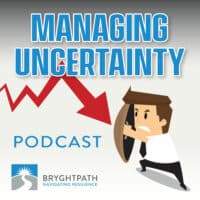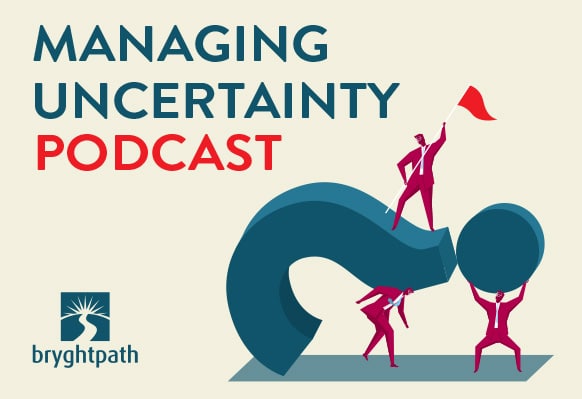
In this episode of the Managing Uncertainty Podcast, Bryghtpath Principal & Chief Executive Bryan Strawser discusses three books he’s read that have impacted our business.
The three books:
- You’re It: Crisis, Change,and How to Lead When It Matters Most, by Leonard J. Marcus, Eric J. McNulty, Joseph M. Henderson, & Barry C. Dorn.
- The Business of Expertise, by David C. Baker.
- The Hard Thing About Hard Things: Building a Business When There Are No Easy Answers, by Ben Horowitz.
Related Episodes & Articles
- The Struggle, by Ben Horowitz
- The Harvard National Preparedness Leadership Initiative
- The Bryghtpath Professional Reading List
Episode Transcript
Hello and welcome to the Managing Uncertainty Podcast. This is Bryan Strawser, Principal and Chief Executive here at Bryghtpath. And in this week’s episode, episode 148, I want to talk about three books that I’ve read that have had a big impact on our business.
I want to go back first to early in my career. I was in crisis management from 2005 to 2006. And then I went off and did some other things and then I came back to a role in 2009 in a Fortune 30 retailer where I was leading the business continuity crisis management and global intelligence capability for the organization. And in 2011, they sent me off to school at Harvard University’s National Preparedness Leadership Program or NPLI, where I was taught by leaders like Eric McNulty, Dr. Leonard Marcus, and Dr. [Barry 00:00:53] [Dorn 00:00:53]. Dr. Dorn actually was my faculty mentor for my project team during my time there at the Kennedy School.
And in 2019, they published a book called You’re It: Crisis, Change, and How to Lead When It Matters Most. This book has had a significant impact on my thinking on crisis management but in reality, it was the academic learnings that I had from then in 2011 through 2012 during my time there in the NPLI Program where I learned their theories on crisis leadership. I consider this book to be really the summation of their life’s work which still continues on how to lead in a crisis, how to prepare, how to respond, and how to recover.
The core part of their book is the concept of meta-leadership. This is a concept they came to after extensive research and observations of leaders in high-stress, high-stakes situations. And this idea of meta-leadership covers five dimensions. It really reframes the process and practice of leaders with a comprehensive framework for understanding and integrating leadership. It’s a way of driving collaborative activities and it provides a focus on improving the functions of a community and performance.
There are five dimensions of meta-leadership and those are the person. A meta-leader develops high self-awareness, self-knowledge, and self-regulation. They build the internal capacity to confront fear and leave themselves and others out of the emotional basement. The second to mention is the situation. Even without complete information, a meta-leader maps the situation to determine what is happening, who are the stakeholders, what is likely to happen next, and what are the critical decisions and options for action? The third is connectivity. That the meta-leader charts a course forward. They make decisions. They operationalize those decisions, and they communicate effectively to get wide organizational engagement and support. They navigate the distinct dynamics and complexities of leading this type of connectivity. And that type of connectivity is about leading down within their organization, up to whom they’re responsible to, across to their peers and to other units, and then beyond to the outside entities including the general public and the media. And that creates a community unity of purpose and effort.
So the first book is You’re It: Crisis, Change, and How to Lead When It Matters Most. The second addition is currently available on Amazon and again, Leonard Marcus, Eric McNulty, Joseph Henderson, and Barry Dorn are the authors.
The second book, more of a recent book that has had an impact on our organization is The Business of Expertise: How Entrepreneurial Experts Convert Insight Into Impact + Wealth by David C. Baker. David writes. David is a consultant for creative agencies so more in the marketing and advertising space, generally. And I would think of this as a manifesto about using expertise, about elevating the impact of advisors who sell insights as individuals, as experts.
There are a few foundational chapters at the beginning about how experts work. By isolating patterns in data, converting those insights to products and positions, the crafting of unique positioning for which there are no other substitutes or few other substitutes, and then how they grow their confidence as the marketplace embraces their application of expertise.
The rest of the book, 16 more chapters, builds on that foundation. Each chapter is structured around a single question. What’s the role of expertise in a society? How important is it for experts to love the hard work required to hone their expertise? And then how do we see all of that in the context of our own purpose in the world?
David goes into several other topics such as positioning, about how to keep your deep, narrow expertise from blinding you to broader relevance. How you frame your expertise in horizontal or vertical terms and laying out core principles for that and understanding the difference between strategy and implementation.
I think David’s book, as a business owner, has really helped me think about the role that expertise plays in our business. It’s helped me think about our positioning as a firm, that our experts in crisis management, business continuity, and crisis communications. But I also think there’s relevance for business continuity, crisis management, and crisis communications professionals. You are a subject matter expert in the thing that you do. And I think this book, even though it’s geared towards entrepreneurs, can even help you as that business continuity, crisis management, and/or crisis communication leader inside of a large organization. I know if I had had this book during my time inside of a large company that I think it really would have helped me think about how to position and use that expertise inside of the organization.
The last book is one of my favorites by far. This book is by Ben Horowitz who is a venture capitalist at a firm that he founded, Andreessen Horowitz, one of the most successful Venture Capital firms of the last 15 to 20 years. His book from 2014, The Hard Thing About Hard Things: Building a Business When There Are No Easy Answers. Ben’s book, essentially, Ben took a number of long essays that he wrote, long articles he wrote for their website which is a16z.com and turned these into even longer book chapters and then integrated those into the book.
I have found this to be the best business book I’ve read of all the different books I’ve read related to business. I learned a lot from his experiences as a CEO, and then now, as someone who invests in and advises CEOs and senior leaders on building their business. One of the favorite things that Ben ever wrote and wrote several years ago, I think back in 2011, was about the struggle that entrepreneurs go through. He summarizes that all entrepreneurs go through this experience where you start off with a very clear vision for success and you create an amazing environment. You hire the smartest people to join you. And all of you together are going to build a beautiful product that delights customers and makes their worlds a little bit better. And it’s going to be absolutely awesome.
And then you wake up to find out that things didn’t go as planned, that the company didn’t unfold the way you expected. Your product has issues that will be hard to fix. The market’s not quite what it’s supposed to. Employees are losing confidence and some of them may quit. And he writes about this in his post, The Struggle, which I’m going to read the core part of this because as a person who has founded a company and now runs that company, this resonates with me a lot.
“The struggle is when you wonder why you started the company in the first place. The struggle is when people ask you why you don’t quit and you don’t know the answer. The struggle is when your employees think you’re lying and you think they might be right. The struggle is when food loses its taste. The struggle is when you don’t believe you should be the CEO of your company. The struggle is when you know you are in over your head and you know that you also cannot be replaced. The struggle is when everyone thinks you’re an idiot but no one will fire you.
The struggle is when self-doubt becomes self-hatred. The struggle is when you are having a conversation with someone and you can’t hear a word they are saying because all you can hear is the struggle. The struggle is when you want the pain to stop. The struggle is unhappiness. The struggle is when you go on vacation to feel better and you feel worse. The struggle is when you are surrounded by people and you are all alone. The struggle has no mercy. The struggle is the land of broken promises and crushed dreams. The struggle is a cold sweat. The struggle is when your guts boil so much that you feel like you’re going to spit blood. The struggle is not failure but it causes failure, especially if you are weak and always if you are weak. Most people are not strong enough.
Every great entrepreneur from Steve Jobs to Mark Zuckerberg has gone through the struggle and struggle they did. And you are not alone. But that does not mean that you will make it. You may not make it and that is why it is the struggle. But the struggle is where greatness comes from.”
These are three of my favorite books that have influenced my outlook as a subject matter expert, as a business leader, and as someone who owns and manages a firm focused on expertise. I’d love to hear what your favorite books are. Come on over to our private community for crisis management, business continuity, and crisis communication professionals and continue the conversation.
That’s it for this week’s edition of the Managing Uncertainty Podcast. We’ll be back next week with another new episode. Be well.

